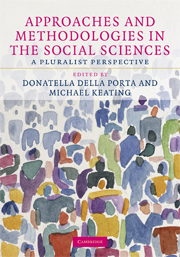Book contents
- Frontmatter
- Contents
- List of figures
- List of tables
- Contributors
- Preface
- 1 Introduction
- Part I Epistemology and philosophy of the social sciences
- 2 How many approaches in the social sciences? An epistemological introduction
- 3 Normative political theory and empirical research
- 4 Causal explanation
- 5 Constructivism: what it is (not) and how it matters
- 6 Culture and social science
- 7 Historical institutionalism
- 8 Game theory
- 9 Rationality and recognition
- Part II Research design
- References
- Glossary
- Index
5 - Constructivism: what it is (not) and how it matters
Published online by Cambridge University Press: 05 June 2012
- Frontmatter
- Contents
- List of figures
- List of tables
- Contributors
- Preface
- 1 Introduction
- Part I Epistemology and philosophy of the social sciences
- 2 How many approaches in the social sciences? An epistemological introduction
- 3 Normative political theory and empirical research
- 4 Causal explanation
- 5 Constructivism: what it is (not) and how it matters
- 6 Culture and social science
- 7 Historical institutionalism
- 8 Game theory
- 9 Rationality and recognition
- Part II Research design
- References
- Glossary
- Index
Summary
Introduction
One of the fundamental issues in social science is about what we know and how we know it (see della Porta and Keating, ch. 2). Constructivism addresses these issues in a distinctive way, but one that is often misunderstood. For a long time, constructivists were sequestered to the margins of social science, along with other ‘reflexivists’, because they had not used the conventional methodological tools. On the other hand, they are not to be confused with ‘deconstructionists’ in denying truth or preaching relativism. Now they are admonished to seize the middle ground (Adler 1997: 319–63) and to demonstrate by their commitment to science that they are doing neither. This all raises sensitive issues about the nature of reality and the possibility of creating warranted knowledge, as well as the nature of proofs or tests.
Obviously, we need to sort out some things before we understand what constructivism is, as opposed to some other post-modern approaches such as deconstruction, and before we can show how a particular research project might profit from a constructivist perspective. Therefore, I will clear some ground in the remainder of this section before I attempt a more detailed examination of constructivism. The following sections are devoted to some major issues in social theory (concept formation and explanation) when addressed from a constructivist perspective.
Information
- Type
- Chapter
- Information
- Approaches and Methodologies in the Social SciencesA Pluralist Perspective, pp. 80 - 98Publisher: Cambridge University PressPrint publication year: 2008
Accessibility standard: Unknown
Why this information is here
This section outlines the accessibility features of this content - including support for screen readers, full keyboard navigation and high-contrast display options. This may not be relevant for you.Accessibility Information
- 30
- Cited by
